After surviving years of emotional chaos, sometimes the most powerful lessons don’t come from therapists or books.
They come from simple stories that remind you who you are.
I learned this in the quiet aftermath of family battles, the kind that leave no bruises, just the sting of being unseen.
My mother’s silence could last days.
My brother’s temper had the same sharpness my mom once used on me. My sister mirrored her control, sweetness dipped in condescension.
Each story I’ll share mirrors a stage of healing: shame turning into strength, exhaustion giving birth to empowerment.
These are truths I held onto when I was rebuilding myself from the debris of manipulation and guilt.
They’re reminders that the parts of you narcissists tried to erase are the very parts that make you whole again.
Table of Contents
The Cracked Pot: Finding Purpose in Your Scars
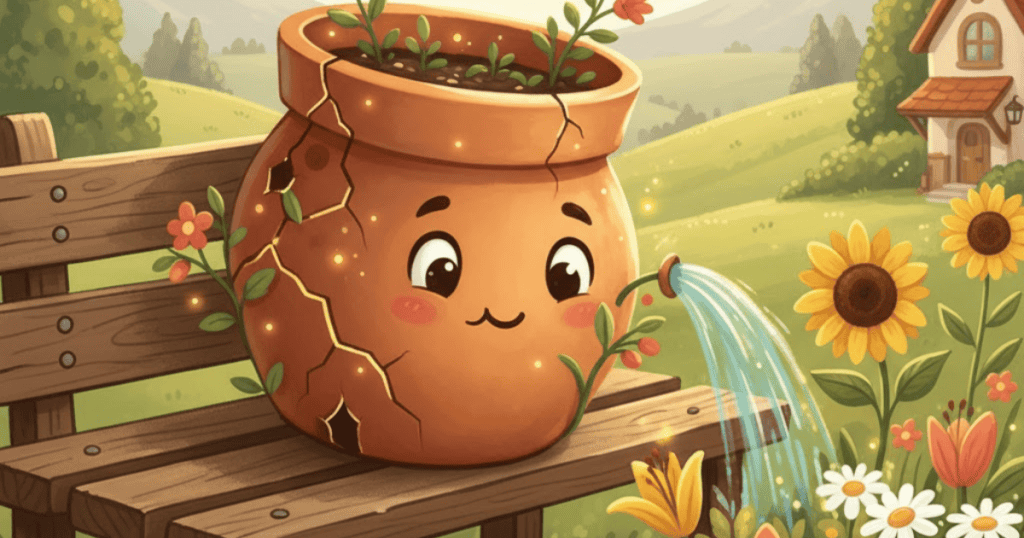
A farmer carried two pots to the river each morning, one flawless, the other marred with a long crack.
Every day, he filled them both and walked the same path home.
By the time he arrived, the cracked pot had leaked half its water. Burdened by shame, it apologized.
The farmer smiled and said, “Look behind you. Flowers bloom along your path. You’ve been watering them all this time.”
Why Your Scars Hold Power
For years, I was that cracked pot.
My narcissistic mother would say, “You’re too sensitive. Always taking things personally.”
That sentence became my identity.
I believed sensitivity was weakness. That to be strong meant to feel less, to detach.
I remember one particular evening vividly.
I had just finished dinner, helping my dad wash dishes in silence while the tension from my mom’s earlier outburst still hung in the air.
My hands shook as I scrubbed. Then I noticed the dying plants near the fence had sprouted tiny buds.
Dad smiled and said, “They’re alive because you’ve been watering them with dishwater.”
That hit me deeper than he realized. Even when I felt useless, something in me was still nurturing life.
It took me years to see that the cracks my narcissistic family mocked were my biggest strengths.
My empathy, my sensitivity, my need to understand people.
Toxic families despise those traits because empathy exposes manipulation.
Sensitivity sees what denial hides.
When I began helping other women recognize emotional abuse, I realized my supposed “flaws” were tools.
My empathy became intuition. My sensitivity became discernment.
Healing from narcissistic abuse begins when you stop resenting your cracks.
They’re evidence of survival, proof that, despite everything, you’ve continued to pour life into the world around you.
Your scars aren’t shameful. They’re sacred irrigation lines where beauty has bloomed behind you all along.
The Empty Cup: Letting Go of What You Thought You Knew
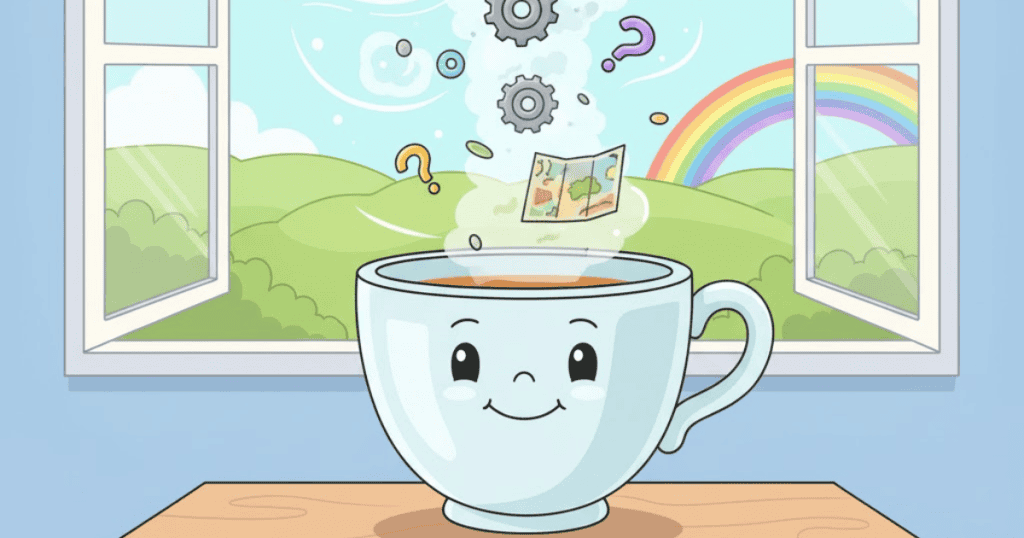
A teacher poured tea into a student’s cup. The tea rose to the brim, then spilled over, yet the teacher kept pouring.
Alarmed, the student exclaimed, “Stop! The cup is full. No more will fit!”
The teacher said, “Like this cup, you are full of your own opinions, assumptions, and beliefs. How can you learn anything new if you never make room for it?”
Why Unlearning Is the Hardest Part of Healing
The hardest part of narcissistic abuse recovery is unlearning what you thought love and safety meant.
I used to think being good meant being quiet.
That loyalty meant forgiveness, no matter the cost. That love meant bending until my spine cracked.
My jealous sister once accused me of being “too independent” and said that I make everyone feel useless.
I wanted to shrink. Then I realized she wasn’t describing me but the discomfort of losing control.
Unlearning unhealthy traits meant rewiring decades of programming and stopping myself from overexplaining or chasing validation.
It meant recognizing when my body tensed around familiar manipulation and learning to breathe instead of defending.
The truth is, narcissistic families install belief systems like malware.
You’re programmed to equate love with performance, guilt with goodness, exhaustion with worth.
Healing requires wiping those codes clean, an act that feels terrifying because chaos has always felt like home.
But peace will feel foreign before it feels safe. Let it.
Emptying your cup is an act of rebellion. It’s saying, “I will no longer sip from the poison that poisoned me.”
Once the lies drain out, you finally have room for something new, like truth that nourishes instead of depletes.
The Pencil Lesson: How Pain Shapes You
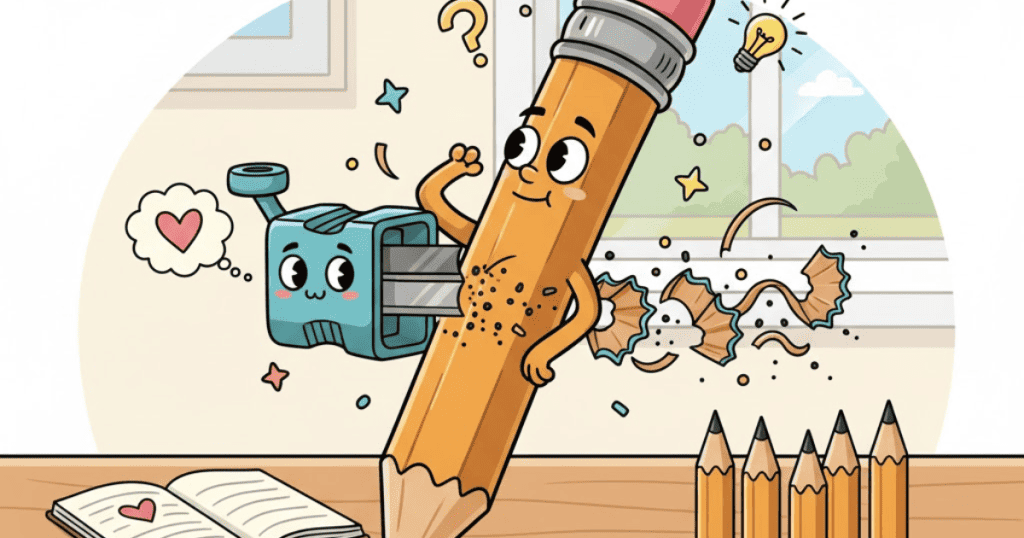
A pencil maker spoke to a newly crafted pencil before placing it in its box. “You will be sharpened again and again,” he said.
“It will be painful, but it’s the only way you’ll leave a mark. Each cut will shape you, refine your core, and bring out the words you were meant to write.”
The pencil listened and understood that the pain wasn’t punishment, but preparation.
How Your Pain Becomes Purpose
Every survivor I know has a “sharpening moment,” that one experience that breaks you open so deeply, you can never unsee the truth again.
Mine happened when my brother got angry that I wouldn’t mediate another fight with our mom.
He said, “You’ve changed. You think you’re better than us.”
For the first time, I didn’t feel guilt. I felt grief, the kind that comes with finally realizing the family I had spent years trying to fix only wanted control.
That was the day I became the pencil.
The sharpening had been happening for years. Every argument, every manipulation, every tear-stained apology.
That realization changed everything.
I stopped seeing myself as broken and started seeing myself as being crafted.
When I began writing about my experiences, I realized how much truth can come from pain.
It becomes ink for others who can’t yet speak.
Your suffering doesn’t make you special, but what you create from it does. It turns chaos into clarity and pain into purpose.
Every heartbreak, every boundary, every silence is a cut that shapes your point.
And when you finally start writing your truth, you’ll see that your words can draw entire maps of freedom.
The Two Wolves: The Battle Between Old Wounds and New Strength
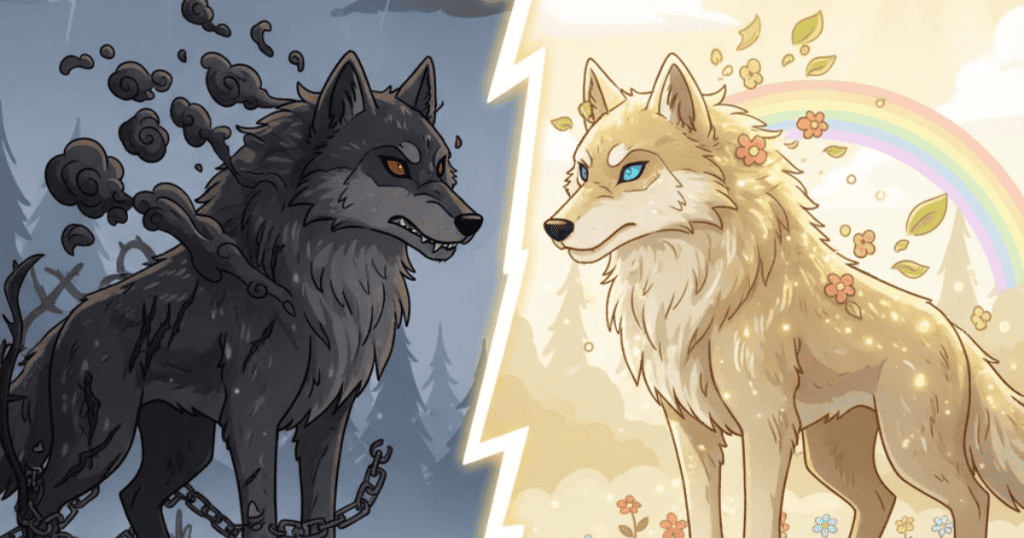
A grandfather told his grandson, “Inside you live two wolves, one kind, one cruel. They fight every day.”
The boy asked, “Which one wins?”
“The one you feed,” said the grandfather.
How to Stop Feeding the Narcissist’s Voice in Your Head
Even after going no-contact, the narcissist’s voice doesn’t leave easily. It lingers like static. Soft but constant.
Mine still echoes sometimes.
I’ll hear my mother’s disapproving sigh when I say no, or my toxic siblings’ mocking tone when I express emotion.
It’s not them anymore. It’s the inner critic they installed.
At first, I tried to silence it with positivity, but that didn’t work.
You can’t drown a ghost. You have to starve it.
Now, when that voice says, “You’re selfish for resting,” I respond, “Resting is strength.”
When it says, “You’ll regret cutting contact,” I whisper back, “Peace is worth the distance.”
Reprogramming your inner world takes vigilance, but it’s how you win.
One night, after a long day, my mind replayed a memory of my mother’s words, “You’ll never make it without me.”
But I did. I had made it without her. The bills were paid, my home was peaceful, and my mind was mine.
That’s when I understood that the cruel wolf only lives if you feed it with attention.
Each act of self-respect, every small boundary, every quiet “no,” is a meal for the kind one.
Healing is a daily choice, a thousand re-directions toward the wolf that wants you to thrive.
The Stonecutter: Letting Go of Comparison
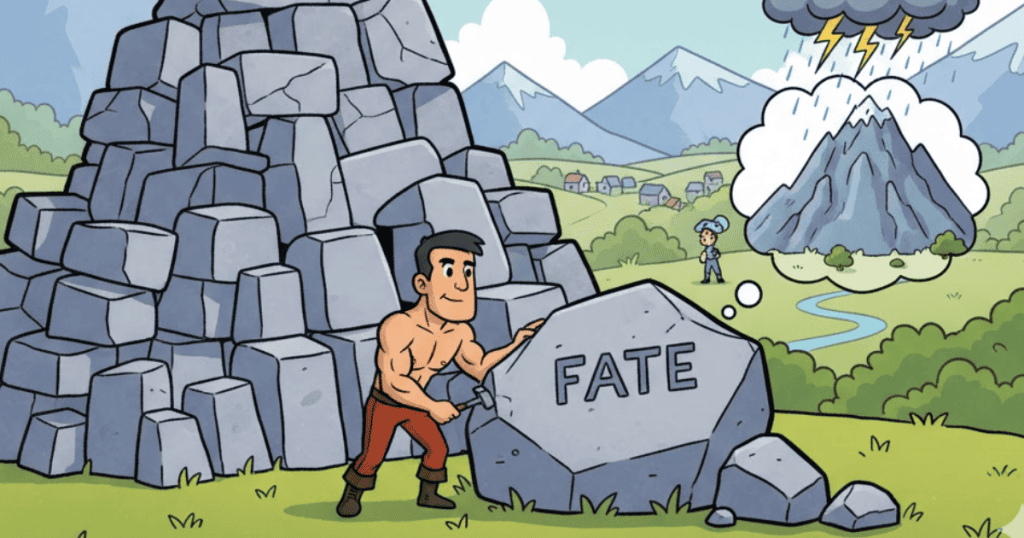
A stonecutter once grew tired of his simple life. Each day, he watched others and wished to be like them.
The wealthy merchant, the powerful ruler, the sun, and the clouds.
One wish after another was granted, until finally, he became a mighty rock, strong and unmoving.
Content at last, he rested in his new form, until a stonecutter came along with a hammer and began to shape him once again.
Why Comparison Keeps Survivors Trapped
In narcissistic families, comparison is currency. It’s how control is maintained.
“Why can’t you be more like your sister?” “Your brother’s already doing better.” “You always fall short.”
I grew up graded on invisible scorecards.
Even as an adult, I measured myself the same way. Every time I saw someone further along, I’d feel behind.
One day, while organizing my dad’s old toolbox, I noticed that every tool was different, but each one was vital.
None compared itself to the other. They just did their job.
It made me realize that we weren’t meant to compete in the same roles. We were meant to function.
Comparison is a survival habit from narcissistic households.
It keeps you in a constant loop of “not enough,” ensuring you never notice how capable you already are.
Healing means stepping out of that system entirely, refusing to measure your worth against people still stuck in the game.
Now, when my toxic sister flaunts her achievements or my brother tries to bait me into defending mine, I simply smile.
True power is quiet, the kind that doesn’t need an audience.
You win the moment you stop playing.
The Starfish: Why Small Acts of Healing Still Matter
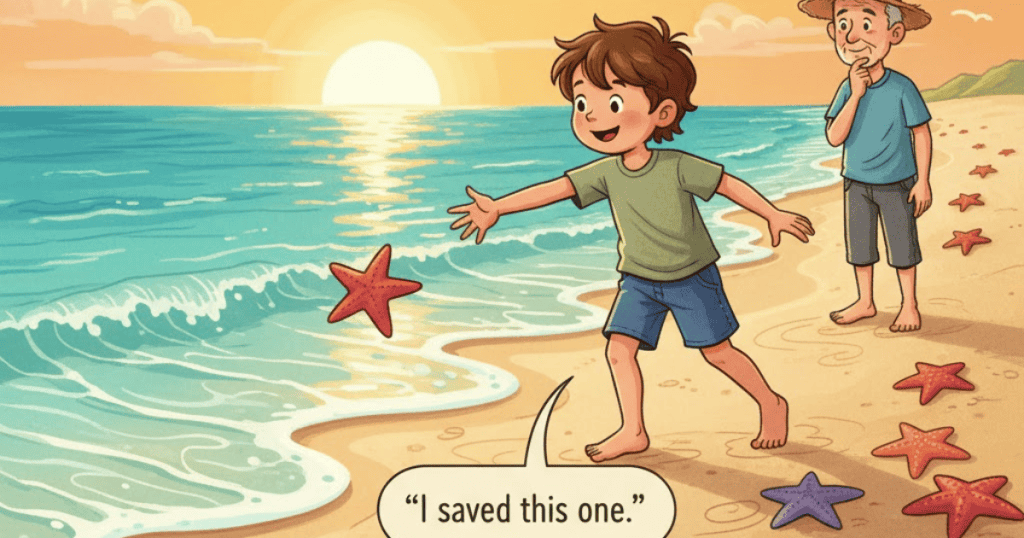
A man was walking along the beach after a storm when he saw a boy picking up stranded starfish and tossing them back into the sea.
Curious, he called out, “There are thousands washed ashore! You can’t save all of them.”
The boy picked up another and said, “I saved this one.”
How Tiny Steps Build Unshakable Strength
Recovery isn’t cinematic. It’s mundane, repetitive, sometimes lonely, but every small act matters.
When I first went no-contact, my mornings were empty.
No toxic texts. No walking on eggshells. The silence felt unbearable.
I’d catch myself reaching for my phone, craving chaos because it was familiar. But I stayed still.
I made coffee. I walked my dog. I called my dad. And in that small routine, healing began.
Every time I chose peace over panic, I threw another starfish back into the ocean.
When my aunt tried to guilt me for “abandoning family,” I didn’t argue. I simply said, “I love you, but I need distance.”
Then I hung up. That small act felt like lifting a mountain.
That’s what real recovery looks like.
Not grand epiphanies, but micro-moments of alignment, choosing safety, self-trust, and silence over chaos.
Even when progress feels invisible, it’s happening.
Your nervous system rewires quietly. Your confidence rebuilds one breath at a time.
You may not heal everything at once, but each choice proves you’re alive and moving forward.
Your Scars Tell Stories That Still Bloom

You don’t have to rebuild overnight.
You just have to believe that your cracks, your pauses, and your efforts are proof of life returning.
Each of these stories reflects a phase of the journey:
- The Cracked Pot: Awareness of your worth.
- The Empty Cup: Surrendering false truths.
- The Pencil Lesson: Refinement through pain.
- The Two Wolves: Reclaiming your inner voice.
- The Stonecutter: Rejecting competition.
- The Starfish: Trusting small steps.
Healing from narcissistic abuse is returning to the person you were before the conditioning, before you were told your heart was wrong for feeling.
Your scars don’t ruin your story. They write it.
And when the day comes that someone else looks at you and says, “How did you survive that?” you’ll smile, because you’ll know.
You were never broken. You were being rewritten into something truer.
Related posts:
- Setting Boundaries vs. Seeking Revenge (And Why Narcissists Confuse the Two)
- Healthy Narcissism: The Surprising Trait That Can Actually Help You Heal
- The Best Mental Health Advice I Ever Received After Narcissists (Simple Yet, So Soothing)
- 5 “Healthy” Coping Habits That Actually Keeping You Stuck After Narcissistic Abuse
- 7 Patterns Resilient People Have After Healing From Narcissist Trauma



Thank you for sharing your insights. Sadly . yet, encouragingly, it’s all very relatable.
I had no idea what was happening for a very long time until reality RIPPED my eyes open.
Awareness of a difficult personality or two in ones life is heavy. However, that is nothing compared to the weight of finding my trust has been invested in a dead end. It feels like waking up after being embalmed, dressed and buried alive. I’ve been left in the dark but your supportive words help me dig my way out.
Thank you for helping me hope.